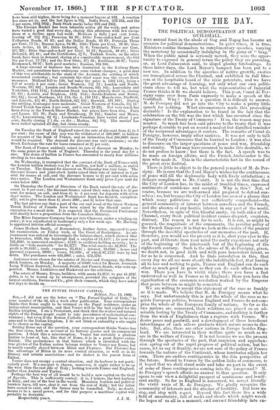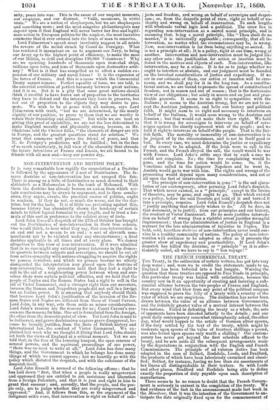TOPICS OF THE DAY.
THE POLITICAL DEMONSTRATION AT THE GUILDHALL.
TUE annual feast in the abode of Gog and Magog has become an occasion for political demonstrations. In quiet times, it is true, Ministers confine themselves to complimentary speeches, varying the monotony by occasionally indulging in the game of " brag." When the public mind is seriously moved, they seize the oppor- tunity to expound in general terms the policy they are pursuing, or, as Lord Palmerston said, to dispel gloomy forebodings. In these latter days, the Lord Mayor's banquet has been put to a new use. In addition to the speeches of native growth, exotics are transplanted across the Channel, and exhibited in full blos- som at the hospitable board of the civic potentate, and we have the great advantage of learning, not only what our own politi- cians chose to tell us, but what the representative of Imperial France thinks it fit we should believe. This year, Count de Per- signy came over from Paris expressly to make a speech at the Guildhall. Why ? This is a question it is difficult to answer. 31. de Persigny did not go into the City to make a. pretty little speech for nothing. What circumstances made this proceeding desirable ? Is the explanation to be found in the fact that the celebration on the 9th was the first which has occurred since the signature of the Treaty of Commerce ? If so, the reason may pass muster. So much has been said adverse to the treaty that it was perhaps desirable to put on record a modest but dignified reminder of the reciprocal advantages it confers. The remarks of Count de Persigny, however, imply other motives. It was not only to talk of the Treaty of Commerce that he hurried to London ; it was also to discourse on the larger questions of peace and war, friendship and enmity. What may have occurred to make this desirable, we do not profess to know ; but there is the fact. A speech was to be made on foreign affairs, and the French Ambassador is the man who made it. This is the characteristic fact in the record of the great civic festival.
There is little to object to in the general remarks of M. de Per- signy. He is sure that the Lord Mayor's wishes for the continuance of peace will fill the deplomatic body with lively satisfaction ; a delicate compliment to Mr. Cubitt. It is not the first time that the City of London has, in the midst of troubled times, expressed sentiments of confidence and security. Why is this ? Not, of course, because we are well-armed and prepared to defend our- selves ; no, but because the City of London has seen at a glance that which many politicians do not sufficiently comprehend—the general community of interest between ourselves and the French, and the absence of any hostile interest in any part of the world. Nevertheless, in spite of this blissful amity, on both sides of the Channel, every fresh political incident causes disquiet, suspicion, distrust. The reason is not far to seek. It is not, as might be guessed, the magnitude of the armaments, the peculiar policy of the French Emperor ; it is that we look at the events of the present through the deceitful spectacles of our memories of the past. If, therefore, you would see the present as it is, shut your eyes to the past, and olliterate from your mind the costly experience not only of the beginning of the nineteenth but of the beginning of the eighteenth century. Such is the advice of M. de Persigny, given, we doubt not, in good faith and with pure benevolent intent, so far as he is concerned. And he finds consolation in this, that every day we all see more clearly the indubitable feet, that having all to lose and nothing to gain, France and England can do each other as much good in peace as they can do each other harm in war. There you have la verite vraie ; there you have a fact understood as well in France as in England ; there you have the signification of the economic revolution worked by the Emperor that peace between us might be cemented.
We are willing to accept this statement of the ease as frankly as it is made. We believe that M. de Persigny means what be says. But unfortunately this is not the whole of the case as re- gards European politics, because England and France do not com- prise the whole of the European family of nations. So far as the two nations are concerned, their relations are placed on an ad- mirable footing by the Treaty of Commerce, and nothing is further from the wish of Englishmen than a rupture with France. We desire peace and goodwill, and a development of those beneficent interchanges of each others products which nature seems to dic- tate. But, alas, there are other nations in Europe besides Eng-
land. We are interested in their welfare quite as much as we are in the welfare of France. It is not because we see the present through the spectacles of the past, that suspicion and apprehen- sion spring out of the rapid progress of political action, but be- cause, let us say it frankly, we are not sure of the policy of France towards the nations of the Continent, whose territories adjoin her own. There are endless contingencies in the dim perspective of the future. Bound to France by the golden links of commerce, is it hoped that we shall stand aside and take no part in the event of some of those contingencies coming into the foreground ? M. de Persigny's speech affords no answer to that question. It only opens to our view a delightful prospect of continuous and benifi- cent amity. So far as England is concerned, we accept literally the verite vraie of M. de Persigny. We gladly recognize the community of interests and the absence of hostility. But here we stop, and stop with regret. Beyond this fact there lies a wide field of uncertainty, full of rocks and shoals which might wreck the hopes of us all in a moment, and convert friendship into en-
mity, peace into war. This is the cause of our unquiet moments, our suspicion, and our distrust. "Voila, messieurs, la verite vraie." We are a nation of shopkeepers, but we are shopkeepers and something more ; and the most sanguine philanthropists may depend upon it that England will never barter her free and legiti- mate action in European polities for the amplest, the most lucrative commerce that it ever entered into the brain of man to conceive.
Lord Palmerston's speech must inevitably suggest in all minds the reverse of the medal struck by Count de Persigny. What has rendered it incumbent on us to augment our Navy, to bring our Army up to the highest point of efficiency, to make the most of our Militia, to drill and discipline 130,000 Volunteers ? Why arc we spending hundreds of thousands upon iron-clad ships, millions upon forts, and tens of thousands upon destructive artil- lery? What is it that has compelled us to effect a sudden ex- pansion of our military and naval forces ? It is the expansion of the forces of France. And this is a cause which the Commercial Treaty cannot remove. Perfect equality of force, we are told, is the essential condition of perfect harmony between great nations. And it is so. But it is a pity that some great nations should think it needful ta have forces out of proportion to the territories they have to defend and the interests they have to preserve, but not out of proportion to the objects they may desire to pro- mote. We wish to be at peace with all nations, says Lord Palmerston with truth, "but we are determined, by the manly dignity of our position, to prove to them that we are worthy to retain their friendship and alliance." But while we are bent on giving this proof of amiability, we are not the less determined to make England morally and physically strong, because, as Mr. Gladstone told the Chester folks, "the elements of danger are rife in Europe, and the greatest questions stand for solution." We trust that commerce will prove the friend of peace, and that M. de Persigny's predictions will be fulfilled ; but in the face of so much uncertainty, in full view of the obscurity that shrouds the future intentions Df France and Russia, we are bound to be friends with all men and—keep our powder dry.



























 Previous page
Previous page